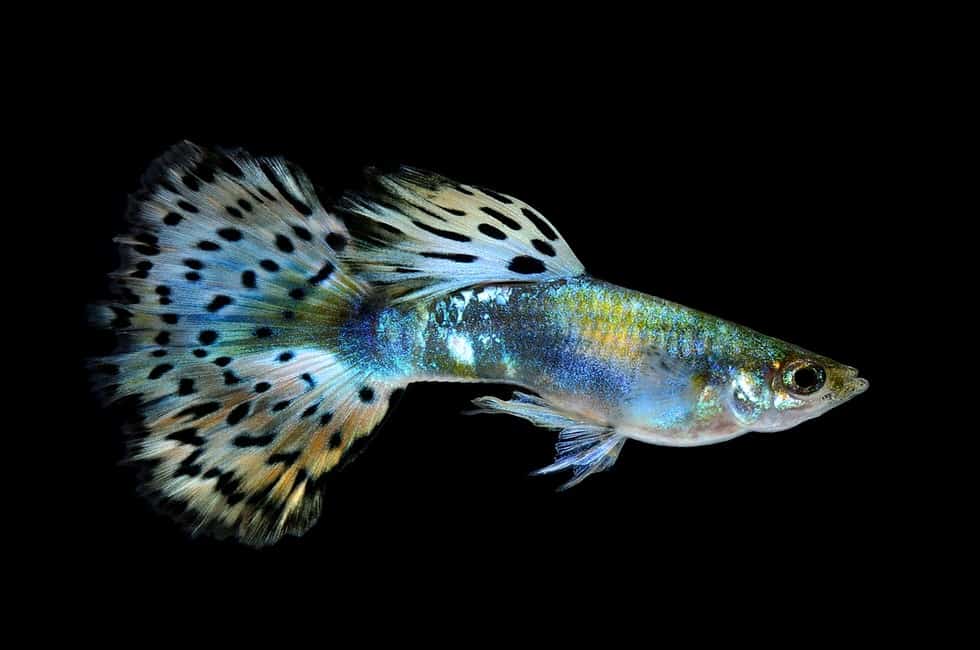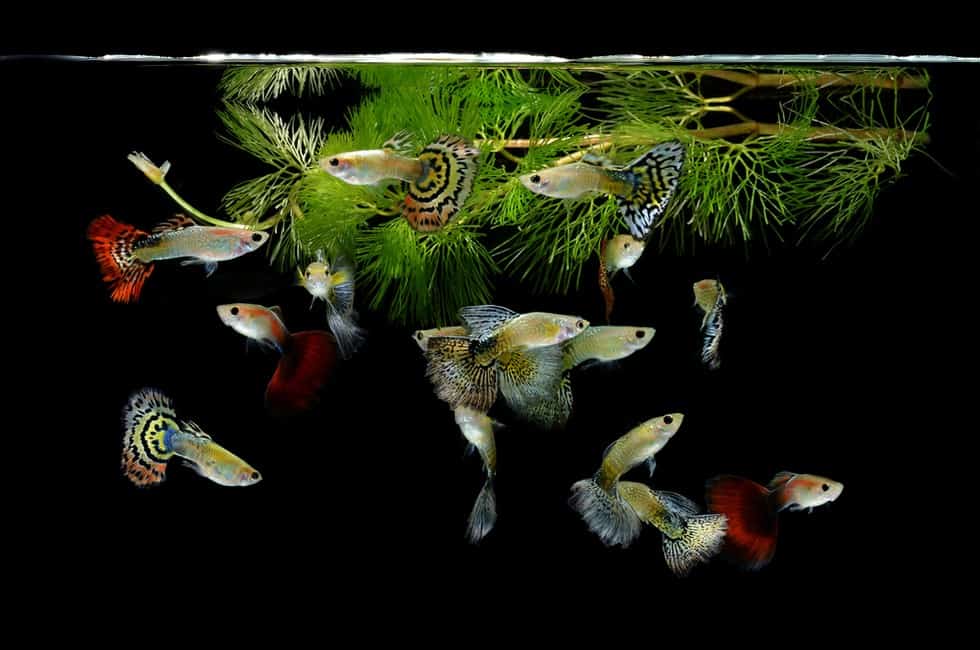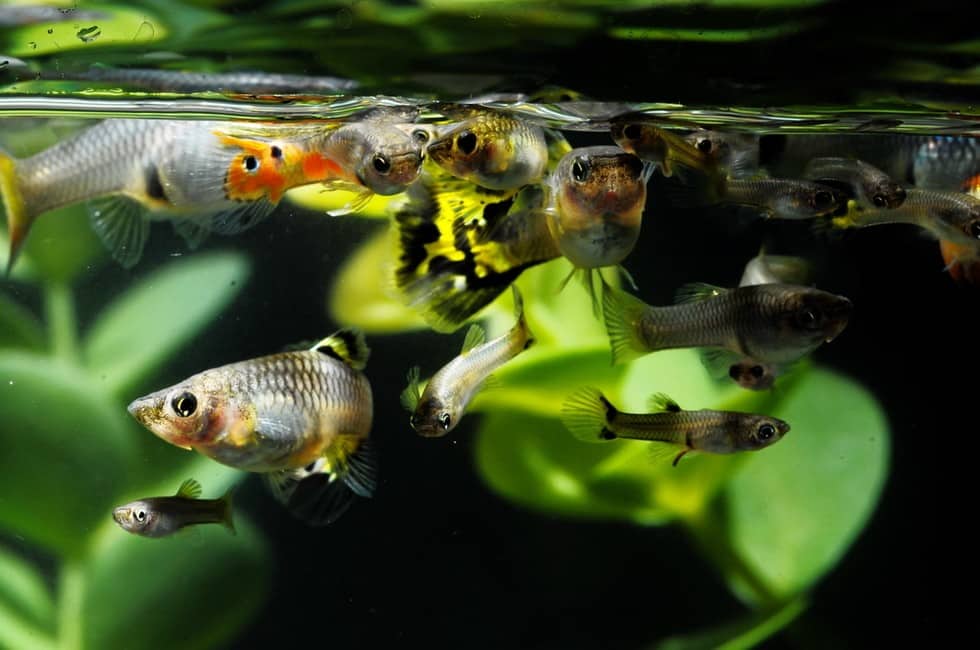Guppies are also referred to as the million fish and sometimes Rainbowfish. They are usually found in tropical climates and they remain some of the most widely distributed fish species in the world.
What is the Life Expectancy of Guppies? The life expectancy of a Guppy is 2 years. Though the lifespan of guppies raised in the wild may vary considerably but usually not more than 24 months. The presence of predators may reduce their lifespan.
The lifespan of guppies raised in fish tanks may be slightly shorter than 2 years, depending on the water conditions, feeding and population of presence of other fish species.
The female guppies usually mature and are ready to produce their first offspring at the age of between 10 and 20 weeks and they continue to reproduce until the age of between 20 and 34 weeks.
Do Guppies Die Easily?
Guppies are not known to die easily, however, they may die quickly when their waste materials are allowed to remain in the fish tank and pollute it for a very long time. Guppies are freshwater fish species, which means they thrive best at pH of between 6.5 and 7.5.
Excessive drainage of Oxygen from fish tank can cause guppies to die easily. Similarly, too cold or too warm aquarium water can cause their death easily.
Over-population, especially with the inclusion of too many other guppies or species of other fishes can also cause their premature death.
Guppies are more sensitive than most other types of fish species, and that is why they require special care to prevent premature death. Presence of diseases and parasites, and weak immune systems can also cause the death of guppies.
Do Guppies Die After Mating?
Yes! Male guppies die after mating with female guppies. The most interesting thing about guppies is the mystery surrounding their reproduction. The female guppies will store the sperm from the male guppies they mated with, to produce their offspring.
The female guppies naturally live longer than the males, and the ability of these females to store sperms do benefit both the male and female population.
The stored sperm in females allow the short-lived males to sustain their reproductive lifespan and also pass their genes to their offspring, long after they die.
The Guppy sperm held inside the bodies of the female guppies are capable of surviving the stress that even adult male guppies cannot survive in their lifetime. As much as a quarter of baby guppies in the world today are fathered by dead adult male guppies.
The 5-gallon tank should be enough for two guppies. A long-term investment in 10-gallon tank will make a lot of sense if you plan on raising the guppies for several years.
Guppies are generally okay with more Oxygen on the surface and when the temperatures do not exceed 70°F. It is important to maintain the tank water at room temperatures to protect your guppies from severe problems.
Despite their relatively shorter lifespan, Guppies are still considered to be hardy, especially for beginner fish tank owners.
Thing you Can do to Improve their Longevity
Perhaps the first thing to do to ensure that your Guppies live longer is to remove their waste materials from the water as frequently as possible.
Instead of removing 10% of the water and replacing it on daily basis, you should target the removal and replacement of 25% of the tank water on daily basis.
The removal of the waste materials from the tank water will help reduce the risks of parasitic diseases that diminish the lifespan of the guppies.
In addition to regular water cleaning and replacement, Guppies need more Oxygen than many other fish species, perhaps you must encourage Oxygen supply on regular basis through the use of water filters and water plants.
Keeping the population low, is another step you must take to extend the lifespan of Guppies in your water tank. Population control has become necessary due to competition for food and space.
Though Guppies can go without food for several days but they can be tempted to eat each other and that could lead to serious crisis.
Secondly, overpopulation in the fish tank can lead to rapid spread of diseases which can wipe out the entire fish population in no time.
Guppies do have weaker immunity and that makes them vulnerable to several kinds of diseases that other fish species could have resisted.
You can control the population by increasing the tank size from 5 gallons to 10 and making sure that most of the fries are removed while leaving one male and two female adults behind. The fries may die faster than adult when population is not controlled.
If you are buying Guppies from the store, you should be careful and make sure you start raising them from their tender ages. Guppies that are almost 2 years old are not good for aquarium, their lifespan are shorter , hence they could be outright waste of money.
You should consider fries that are few weeks old and can survive in new environment. Make sure the near fresh water pH and room temperatures are well maintained.
How Long Can Guppies Go Without Eating?
Do you often wonder for how long guppies can survive without eating? The answer is 2 weeks.
Guppies may possess shorter lifespan and look fragile but the adult guppies will incredibly survive without food for 14 days. Just because they can survive without food for this long does not mean, you must abandon your fish tank without feeding your guppies.
The guppy fry will not survive beyond 3 days without a food, and this situation applies to guppies raised in fish tanks and in the wild.
It is important that you prepare your aquarium if you are going away from several days or more than a week. Make sure you perform filtering in the fish tank few days or hours before leaving.
You need to perform a much bigger water change if you wouldn’t be able to feed your guppies for a long time, this means you need to change between 50 and 75% of the water in the tank.
You can program your aquarium light on a timer, which means the light comes and goes at specific times of the day. All decaying matter, especially plants must be removed if you are leaving for a while.
Though, automatic feeders work very well for guppies, such feeders are not always a good choice. You can make use of the automatic feeder to feed the fries but never use the automatic feeder to feed the adult guppies.
Guppies can overfeed when they are hungry, however, it is enough to feed them once or twice a day. Guppies prefer natural foods such as bloodworms and brine shrimps, which they can find in abundance in the wild.
Commercial foods must be handled with care. Make sure you choose a commercial flake food that has good proportions of protein, Vitamins and minerals.
You can also feed your adult guppies and the fries with veggie pellets that contain green components such as Algae, Plankton, and Spirulina.
Fish foods high in Algae, Spirulina and plankton are rich in essential vitamins and can also improve skin resistance against certain parasites. Guppies enjoy brine shrimp, and they are a great sources of fish protein.
Can Guppies Survive in Tap Water?
Though Guppies do prefer fresh water it is not advisable to raise them inside tap water for some reasons. You can run tap water into the tank but you need to leave it uncovered for 24 hours at least before adding your guppies.
You should also add your tank water decorations and some rock with a wooden demarcation (remember, the wood must be boiled before adding to water).
Tap water is known to contain some chlorine levels that may still be non-conducive for guppies, it is important to allow the chlorine levels dissipate by exposing the tank for about 24 hours before adding your guppies.
Room temperature water will work favorably for guppies, provided you prepare the tank well enough before raising them there. You need to provide sufficient space for your guppies, especially if you are raising a male and female or you are including a tank mate. The tank should be at least 5 gallons in size.
More: Ideal Guppy Water Temperature
Guppies are amazing social fishes, so you may want to include a male and two females in a tank, if you plan on raining guppies for a long time. Experts believe that a ratio of 1 make to a 2 females will be ideal for tanks larger than 5 gallons.
If you plan on raising guppy fries, you should consider having some plants in your tank. Guppies are mostly bottom swimmer, hence they tend to rest on the bottom of the tank and also prefer smooth surfaces. You should consider adding some gravel and skipping rocks to promote guppies activities.
Other Facts You Should Know About the Guppies
Unlike most other species of fishes, Guppies don’t lay eggs , rather they give birth to live young and that is one thing that makes these fishes unique. If you pay attention, you will see the eyes of the little guppy through the translucent skin of the mother.
Guppies are also known to eat some of their own young. Though , this behavior is not rampant, it is only common when the tank is over-crowded. It is important to separate the adult ones from their young especially when they give birth.
Though separating young guppies from their parents to avoid over-crowding, can be very stressful to the adult parents, one alternative is to fill the tank with some plant materials so that the fries can hide occasionally from their parents.
Just like many other fish species, Guppies are known to appear in varying sizes and colors. It is even possible to introduce new colors in guppies by allowing mating between guppies of different colors.
Guppies appear in different tail shapes, these could be the veil, flag, lace and the double-sword. The tail type of guppy offspring will likely depend on the parents that produce them.
The male guppies tend to impress the females by wiggling their fins . The male and female are active swimmers . Aside the fact that the fries love to hide, adult guppies are social fishes and hiding may mean that they are ill or stressed.
The male guppies are usually brighter in color than the females and that is one distinct characteristic features to identify them.
| Category | Rating |
| Guppy Care Level | Easy |
| Temperament | Peaceful |
| Color | Varieties |
| Lifespan | 2 years |
| Size | 0.6-2.5 inches |
| Diet | Omnivorous |
| Tank Size | 5 gallons minimum |
| Tank Set Up | Freshwater with plants and substrate |
| Compatibility | Other community or social fishes. |
Conclusion
Though Guppies breed very fast because they are not shy, they will likely breed without any input from the tank owner. For this reason, every tank owner must implement population control as it regards guppies. Most of the problems associated with Guppies have been linked to lack of population control.
Over-population may mean that more excreted wastes will remain in the water , which will rapidly cause pollution and higher pH levels. Since guppies are very sensitive to pH changes, they can develop parasitic illness in no time.
You don’t have to feed Guppies everyday, even the fries can go for few days without food. Feeding guppies too much may force them to abandon the food occasionally and that could lead to rapid changes in the pH of water.
When guppies rub their skin against the tank or any other component, they are probably feeling uncomfortable with the current pH.
It is recommended that you change 10-20% of tank water on daily basis to promote Oxygen especially at the surface and to ensure that the pH of the water , are well-controlled.



